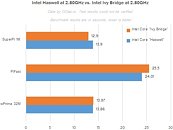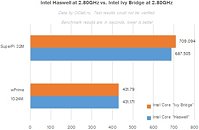Friday, February 1st 2013

Intel "Haswell" Quad-Core CPU Benchmarked, Compared Clock-for-Clock with "Ivy Bridge"
Russian tech publication OCLab.ru, which claims access to Intel's next-generation Core "Haswell" processor engineering-sample (and an LGA1150 8-series motherboard!), wasted no time in running a quick clock-for-clock performance comparison with the current Core "Ivy Bridge" processor. In its comparison, it set both chips to run at a fixed 2.80 GHz clock speed (by disabling Turbo Boost, C1E, and EIST), indicating that the ES OCLab is in possession of doesn't go beyond that frequency.
The two chips were put through SuperPi 1M, PiFast, and wPrime 32M. The Core "Haswell" chip is only marginally faster than Ivy Bridge, in fact slower in one test. In its next battery of tests, the reviewer stepped up iterations (load), putting the chips through single-threaded SuperPi 32M, and multi-threaded wPrime 1024M. While wPrime performance is nearly identical between the two chips, Haswell crunched SuperPi 32M about 3 percent quicker than Ivy Bridge. It's still to early to take a call on CPU performance percentage difference between the two architectures. Intel's Core "Haswell" processors launch in the first week of June.
Source:
OCLab.ru
The two chips were put through SuperPi 1M, PiFast, and wPrime 32M. The Core "Haswell" chip is only marginally faster than Ivy Bridge, in fact slower in one test. In its next battery of tests, the reviewer stepped up iterations (load), putting the chips through single-threaded SuperPi 32M, and multi-threaded wPrime 1024M. While wPrime performance is nearly identical between the two chips, Haswell crunched SuperPi 32M about 3 percent quicker than Ivy Bridge. It's still to early to take a call on CPU performance percentage difference between the two architectures. Intel's Core "Haswell" processors launch in the first week of June.


118 Comments on Intel "Haswell" Quad-Core CPU Benchmarked, Compared Clock-for-Clock with "Ivy Bridge"
If Intel can get a CPU to consume less power but perform just as well, that's a win.
Good chance for AMD to catch up then i guess if this is true?
I mean I'm all for refining and cutting power consumption but as an hardware addict that's just not enough, I want performance on top of it.
Let's just hope Intel goes wild on the core count on skt 2011.
According to Intel's slides a while back, Haswell has some wicked overclocking features, so that might be enough for us to upgrade our SB/IB to it if it clocks significantly higher. It'll be on the same 22nm process however, so I wouldn't be surprised if it doesn't.
The answer you're looking for (and so is everyone else, lol) will be answered when the official reviews come out. It's just that to me, I think the fact it's on the same 22nm process means it will perform similarly to IB.
SO by downclocking an IVB chip, you are not reporting actual performance. you are reporting a gimped performance, with L3 running at a lower speed than intended.
;)
Haswell breaks this design, and has L3 clocked independently, so C2C compare at low clocks doesn't tell you anything, but what a broken IVB does vs a non-broken Haswell.
Which makes this compare stupid, and that's why it was allowed. It's not a "real" performance compare.
Looks like Cadaveca's answered your question nicely - this performance test isn't valid. :)
This is not the first time Haswell has been shown running publically.
However, I need a board and to clock a chip myself before I am 1000% on that.
www.anandtech.com/show/6355/intels-haswell-architecture/6
if all these changes translate in a lousy 5-10% increase then they need to do some serious work.
But then again, like someone said why improve a dead x87 code anyway. Imo those leaked benches mean squat. I say bring on real applications and games that will love bigger registers, more execution branches, faster single threaded optimizations and what not. :)
Also this: twitter.com/FPiednoel/status/296459612377468928
Edit: Also check out some of his other tweets in his timeline, he clearly states that if you have a "healthy" Haswell, under no circumstance will it be slower than IVB. He is Principal Engineer / Performance Architect at Intel so I am inclined to believe him.